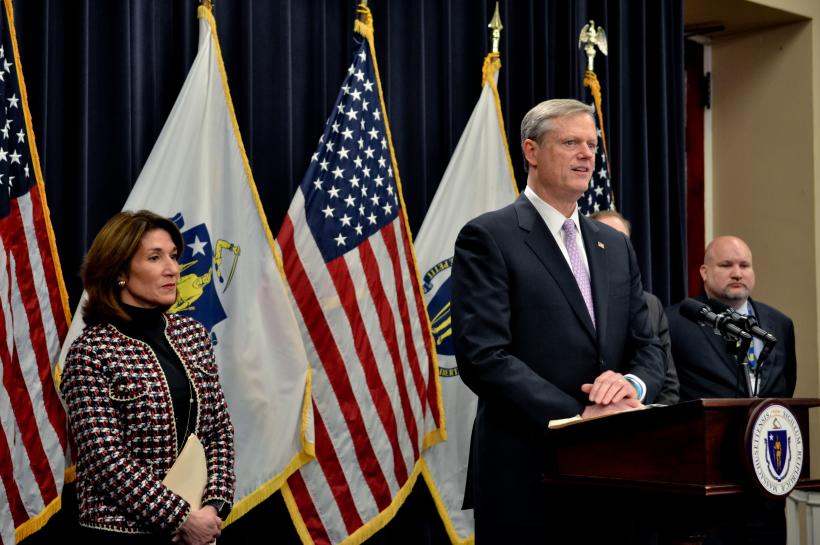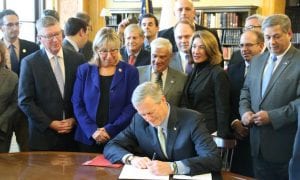
Lt. Governor Karyn Polito, Governor Charles Baker and DESE Commissioner Jeffrey C. Riley (Mass.gov photo)
BOSTON — The Baker-Polito Administration announced on Tuesday a multi-year school finance reform initiative to increase funding for school districts to invest in a quality education and fully implement the recommendations of the Foundation Budget Review Commission. An Act to Promote Equity and Excellence in Education will be filed alongside the proposed Fiscal Year 2020 (FY20) state budget, which includes a significant increase in state education aid to fund the first year of the reform plan.
The reform bill filed today updates the Foundation Budget formula to provide more support for school districts to meet the rising cost of health care and special education costs, as well as educating English language learners and low-income students, and will provide a significant influx of funding for communities with the highest need. The proposal will also target additional support for the lowest-performing schools to offer programs that give every student greater opportunities to learn.
The initiative also gives the Commissioner of Elementary and Secondary Education the ability to support persistently underperforming schools, in part by utilizing a limited amount of Chapter 70 funds, if necessary, to implement needed reforms and investments with the district.
This proposal represents the most significant expansion of the Foundation Budget since the formula was adopted in 1993, and is funded using available revenue.
The Administration’s budget for FY20 includes an increase of $200.3 million in Chapter 70 funds to implement the first year of the reforms, for a total of $5.1 billion in school aid next year.
“Our proposal updates the school funding formula to provide a quality public education for all students, particularly in school districts with the highest needs, across the Commonwealth,” said Governor Charlie Baker. “This initiative will fully fund the Foundation Budget Review Commission recommendations and will make targeted investments for low-income students, minority students, and English Language Learners to help close the achievement gap and support underperforming schools. We look forward to working with the Legislature to update the Commonwealth’s school finance policies, building on the nearly half a billion dollar increase in funding our administration has invested in public education.”
Building on the Administration’s previous investments to implement the Commission’s recommendations, when the school finance reform initiative is fully implemented the Foundation Budget will increase by more than $1 billion (in current dollars), resulting in an increase of an estimated $3.3 billion by 2026.
This is the third consecutive year that the Administration’s budget proposal has included increases for school districts to address rising health care costs, one of the deficiencies identified by the Foundation Budget Review Commission. Over the past two years, Governor Baker signed budgets that increased funds to school districts for health care by nearly $60 million. The Administration also supported an increase of $24.5 million for districts educating English Language Learners in FY19. These increased investments have allowed communities to put more money back into classrooms, with the greatest impact on low-income communities.
The major components of the school finance reform initiative with an impact on the FY20 budget include:
- Full funding of foundation and base aid requirements, reflecting current rate of inflation ($129.9 million increase)
- Further increase in Foundation Budget formula for health care, including benefits for retirees ($30.6 million increase)
- Additional increase in the factor for educating English language learners ($13.6 million increase)
- Increased support to districts serving highest concentration of economically-disadvantaged students ($12.8 million increase
- Minimum aid level of $20 per pupil for all districts ($7.9 million increase)
- Increase in funding to help districts meet rising out-of-district special education costs ($4.3 million increase)
- Introduction of a new enrollment category for students in Early College and Career Pathways ($1.2 million in FY20)
Starting in Fiscal Year 2021, the plan will phase in an expansion of the factor in the foundation budget for counseling and psychological services, which will ultimately add about $75 million (in current dollars) to the statewide Foundation Budget. The Administration’s budget proposal also creates a $30 million trust fund for school safety initiatives.
“By updating the school funding formula to provide more support to enroll students in Early College and Career Pathways programs, we will help high school students gain more work experience and access to college level courses before they graduate,” said Lieutenant Governor Karyn Polito. “This budget will build on the investments our Administration has already made to improve school safety by supporting grants for districts for security and communications upgrades and training for school and public safety officials, among other initiatives.”
The Administration’s school finance reform proposal includes opportunities for struggling schools to partner with the Department of Elementary and Secondary Education to invest in proven strategies that help students learn, such as acceleration academies, after-school enrichment, as well as more professional development and leadership programs for teachers. The budget proposal also includes a new trust fund of $50 million, to be used by the Commissioner of Elementary and Secondary Education to help accelerate improvements in low-performing schools. In addition to this trust fund, the Governor’s budget proposes $26.5 million in targeted assistance funds to help schools improve.
“While this increased investment is incredibly important, how we spend it is equally important to ensure we are using strategies and providing programs that accelerate learning for all students and close achievement gaps,” said Secretary of Education James Peyser. “We are asking the lowest-performing schools to partner with the Department of Elementary and Secondary Education to make reforms that will help our neediest students achieve their potential academically.”
The proposal strengthens the Commissioner of Elementary and Secondary Education’s ability to support schools that are consistently underperforming by giving him authority to work with schools to use a limited amount of a district’s school aid to implement needed reforms and investments.
“While Massachusetts public schools offer many children a strong education, that success has not reached all students,” Elementary and Secondary Education Commissioner Jeffrey C. Riley said. “The measures included in the governor’s proposal will help us ensure that the Commonwealth’s most struggling schools are on the right track to offering their students a strong program and engaging instruction.”
The 1993 Education Reform Act created the school funding formula that determines how much each school district must spend, based on the specific makeup of its student body, to ensure every child receives a solid education. Every school district’s Foundation Budget is different, and calculated specifically for that district. The Commonwealth’s progressive funding formula finds the right balance between state and local contributions to fund districts’ Foundation Budgets. School districts with higher populations of low-income students and English Language Learners have the highest Foundation Budgets. Districts with small populations of students who make up those high-need categories have smaller Foundation Budgets. The law requires communities to pay a share of their Foundation Budget, determined by their local tax base.
Charter School Reimbursement
In addition, the proposal will revamp charter school reimbursements to a three year schedule, with 100 percent tuition reimbursements to districts the first year, 60 percent the second, and 40 percent the third. By revising the reimbursement formula to a three year schedule, the Commonwealth will be a better partner to local communities that experience increasing enrollments in charter schools. This realignment will also ensure that communities spending greater than 9 percent of their total school spending on charter school tuition payments will benefit from a new minimum tuition reimbursement amount.
In addition, the Administration’s plan increases the facilities stipend for charter schools. Currently charter schools get a facilities stipend of $893 for each student, which hasn’t changed in 10 years. This proposal increases that amount by 5% to $938, and then indexes it for inflation going forward.
College Affordability
Along with new investments in K-12 education, the House 1 budget proposal includes a historic $100 million investment to help more students afford college.
The Administration’s reform proposal creates more opportunities for all students to gain skills, knowledge and experience by revising the school funding formula to incentivize high schools that enroll students in Early College and Career Pathway programs. The proposal creates a dependable revenue stream as part of the Foundation Budget formula to support these programs, so more students can earn college credits or professional certificates at no cost to them while they are still in high school.
The House 1 proposal includes a new $100 million trust fund that will enable students entering Massachusetts public and private colleges and universities next year to significantly reduce college costs and have greater opportunities for paid internships and cooperative education. Seeded with revenue from the Administration’s sales tax modernization proposal described in more detail below, the trust fund would set aside $25 million for Commonwealth Commitment, the college affordability program for students transferring from a community college to a public college or university. The trust fund would commit another $25 million to scholarships for students who are participating in proven college success programs at both public and private four-year colleges; $25 million for matching grants to provide work experiences to students attending two and four-year public colleges and universities; and $15 million to expand Early College programs. The trust fund would also set aside $10 million to pilot financial aid strategies that have proven successful in other states to help students complete their degrees.
As part of this expansion, the Baker-Polito Administration will ask public colleges and universities to develop long-term plans to reduce student charges, while still ensuring institutional fiscal sustainability.
“This is a breakthrough budget proposal for students and families who look to Massachusetts’ public colleges and universities to deliver both opportunity and affordability,” said Commissioner of Higher Education Carlos E. Santiago. “This proposed investment could have dramatic impact on both individual lives and the state as a whole – because a highly-educated workforce is the key to economic growth.”








